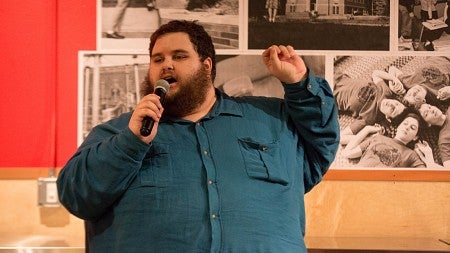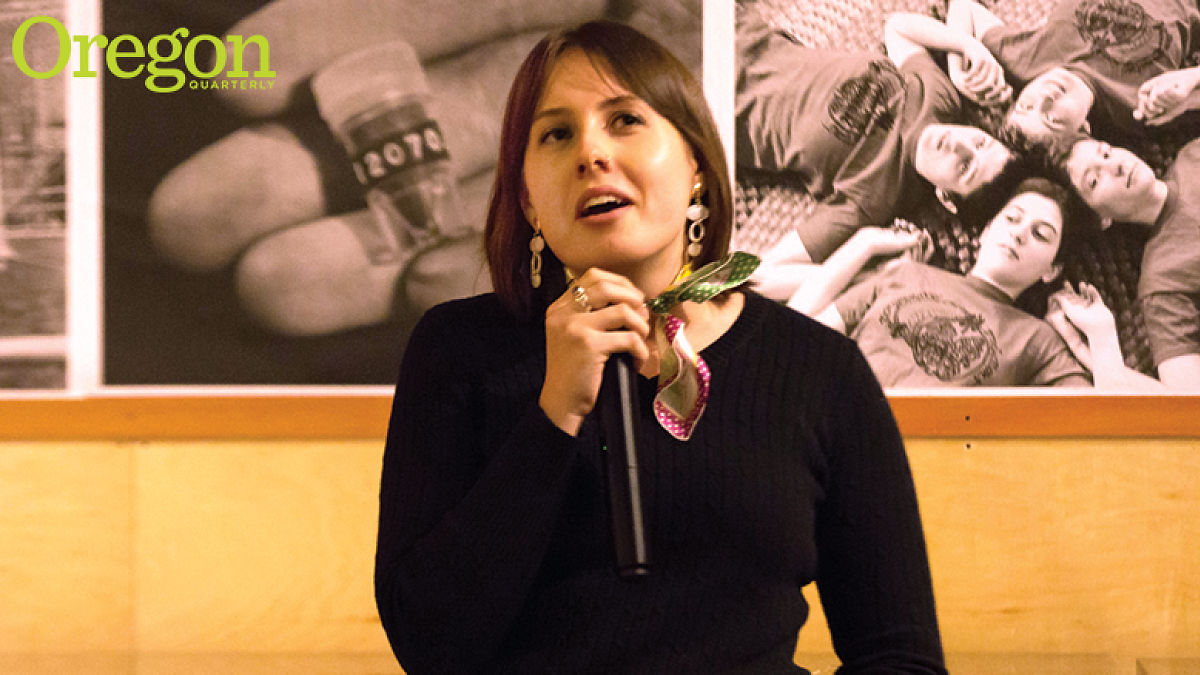A group of Ducks walks into a bar. They take turns telling jokes. Then they break off for beer-and-pizza fueled discussion sessions where they critique, analyze, and help develop each other’s material.
There’s no punchline here, because it’s not a joke—this happens every Wednesday, 9:00 p.m., at the Falling Sky pizzeria in Erb Memorial Union. The student group, the UO Stand-Up Society, sponsors a weekly open mic that brings together aspiring comics from across campus and throughout the Eugene community.
“The UO Stand-Up Society is a club and an event, but I think of it more as a collective of people who want to tell jokes and bring joy to the world,” says Michael Spark, the School of Journalism and Communication advertising major who organizes and hosts the open mic nights.
Spark grew up in Rogue River in southern Oregon, where there wasn’t much of a live comedy scene. As the student body president of his community college, he founded and hosted a charity fundraising event—and felt the satisfaction that comes from making an audience laugh.
After enrolling at Oregon, he wrote new material, practiced in local venues, and started producing “The Morning Mic with Mike,” a weekly streaming radio show. He performed in out-of-town gigs as far away as California.
Spark joined the UO Stand-Up Society to share some of his knowledge and experience. Open mic events, Spark explains, are essential to comedians for developing craft and professional polish. They offer opportunities for beginners to test their courage, for pros to test their newest material, and for joke-slingers at all levels to perform before the toughest audience around: their peers.
Madeline Collins, a senior from Pasadena, California, who performs comedy as Maddie C., says that cracking jokes is more than just a hobby for her. Having decided that she wants a career in the entertainment industry, she values the UO Stand-Up Society as an opportunity to practice and perfect key professional skills.

Comedy has always thrived on edginess, and open mics also serve as a space for comedians to test social boundaries. In an era when college students often get stereotyped as dour enforcers of political correctness, many of these young comedians assert the importance of talking about aspects of human experience that are controversial, dark, discomforting, or—Spark’s preferred term—“messed up.”
Anthony Galindo, a history major from Bellevue, Washington, says he is willing to accept both the applause and the occasional awkward silence from audiences as he works out the extent to which certain taboos can be teased.
“Jokes about political issues or hot-button topics, if they have an element of truth to them, can stick with the listener and really resonate with them. And they can be ten times funnier,” Galindo says.
All content issues aside, for Spark, the act of open and nonjudgmental listening is crucial not only to standup’s enduring popularity, but also its continued—and very significant—role in our society.
“Standup comedy to me is the last form of storytelling that is still in existence,” he says. “Ten thousand years ago people would gather around the fire to hear someone tell stories, and later people would gather around the radio, but today standup comedy is the last venue where people go and hear someone talk for entertainment. I feel like we are holding on to something special.”
—By Jason Stone, University Communications


